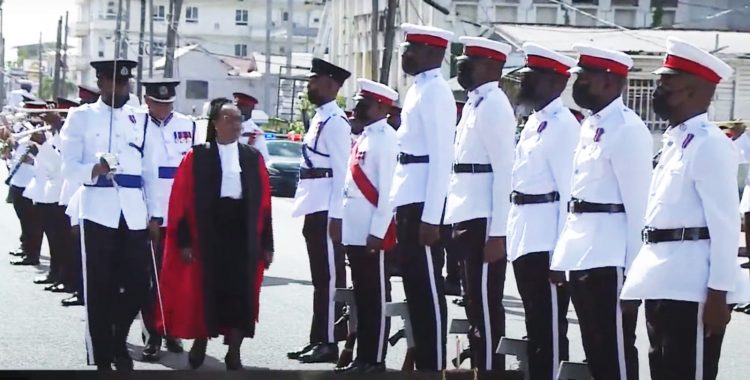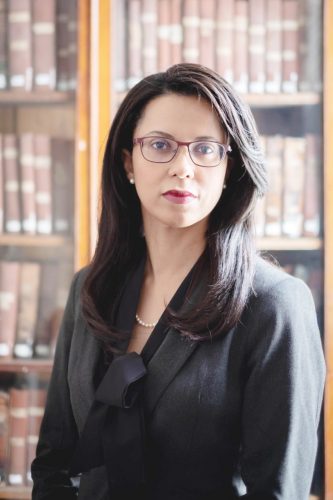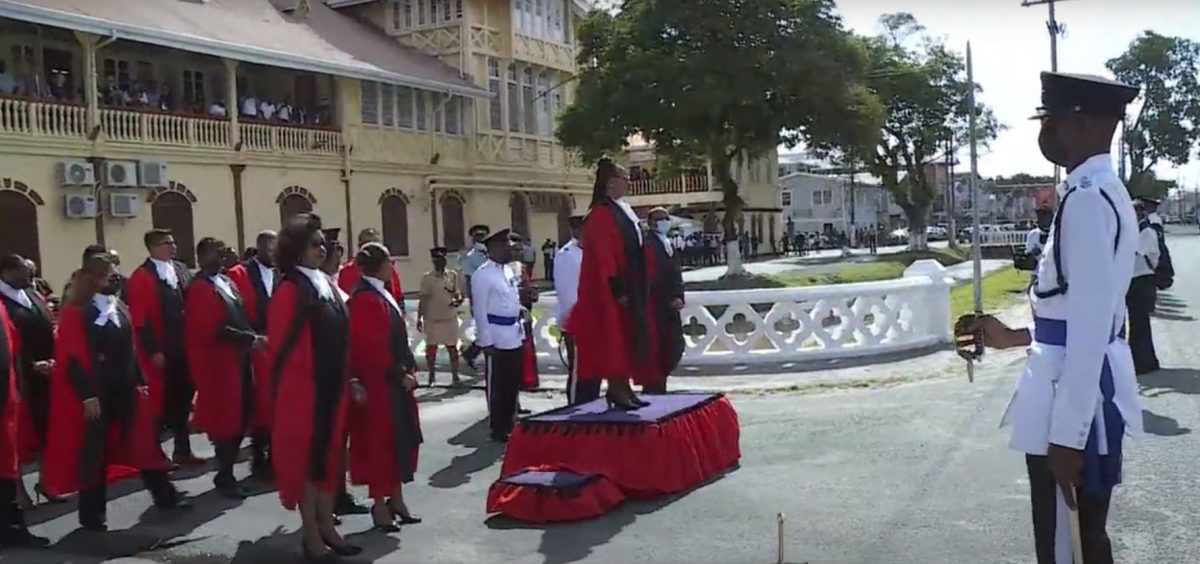After a two-year hiatus, the ceremonial opening of the criminal assizes returned to the High Court in Demerara yesterday morning and heard a renewed call by the Bar Association for confirmed appointments to the top two posts in the judiciary and the recomposing of the Judicial Service Commission.
In contrast to previous years, the ceremony which marks the beginning of the April sessions, saw for the first time cultural displays and toasting by members of the judiciary for the contributions of all the stakeholders in the justice sector.
The march-past by the traditional horse-guard of the Guyana Police Force also saw inclusion of members of the Bench, Magistracy, outer and inner Bar; the Attorney General and the Director of Public Prosecutions.

These unprecedented events were all to mark the inaugural law-week observances of the Bar Council of the Guyana Bar Association (GBA) which is being celebrated under the theme “Advancing the Rule of Law in the New Normal.”
During her address following the opening of the sessions, President of the GBA, Pauline Chase, told the gathering which included members of the legal fraternity, the diplomatic corps and other dignitaries, that the non-confirming of the two top judicial posts and the need still for a reconstituted Judicial Service Commission, were all inimical to the Rule of Law.
In keeping with the week’s theme, Chase said that the aim is to promote the importance of the Rule of Law in society.

With some of its attendant safeguards of balance, fairness and equal access to justice for all, she said that the concept makes for the “bedrock on which [a] good society rests,” fostering the observance of basic democratic principles, the separation of powers and the settlement of disputes, by a fair and impartial tribunal free from political or other interference.
As she broached the issues of the long overdue need for a substantive Chancellor and Chief Justice and reconstituted Judicial Service Commission (JSC), Chase said, “It is therefore inimical to the Rule of Law that they’re acting appointments of our highest judicial officers.”
Chase called on all those on whom the duty so falls, “to start the consultative process and put into motion, the machinery to address the correction” of what she described as “this unworkable and failed formula.”
“It is an embarrassing state of affairs which ought to be corrected with alacrity as we have seen in other matters,” Chase asserted; while going on to note; “It adversely affects our standing in the world in the Rule of Law Index and as a democratic society.”
Chase said she would have failed in her duty as President of the Bar if she were to end her address without raising the effects of the absence of a reconstituted JSC which she says goes without saying.
She declared, “The situation grows more dire with each and every passing day.”
The absence of the JSC means that appointments of new magistrates and judges cannot occur. The judiciary has not had confirmed appointments to the top two posts for over 17 years. The constitution requires that the President and the Leader of the Opposition have to agree to the appointments. There has been no agreement between the two office holders over the years and this has resulted in acting appointments.
In their respective addresses, both the acting Chancellor and acting Chief Justice—Justices Yonette Cummings-Edwards and Roxane George SC spoke of the judiciary’s pleasure at collaborating with the Bar in support of its law-week observances.
For her part, Chief Justice George noted that while the COVID-19 pandemic over the last two years presented unprecedented challenges, there were positives, too, on which she preferred to focus.
Birthed out of the pandemic she said, is a “new normal” which has accelerated the modernization of the courts through the utilization of technology to support their operations; which will be embraced moving forward.
She said that the Judiciary is focused on carving out the technological foundations that will undergird the operations of the Supreme Court.
Justice George said that the pandemic has also allowed for the reassessment of case management in the wider sense so as to provide a more efficient service. In this regard, she said that the court’s website, along with an e-filing mechanism and a Facebook page were developed.
She said that the court has benefited from partnering with the Government of Guyana, and the governments of the United States, Britain and Canada along with the JURIST Project, UNICEF and the National Centre for State Courts in rolling out the suite of recording systems, video conferencing facilities and the container courts.
All these facilities the chief justice (CJ) said allowed for the rapid transition to virtual court hearings and the resumption of jury trials fallowing the onset of the pandemic.
The High Court, she said, will also benefit from enhanced court systems based on technology.
She said that the Bar Association has played an integral role in the development of a case-management system for the Magistrate’s Courts which she said will be a digital system of filing and hearing of matters.
The Supreme Court, the CJ said “is on a transformational trajectory” that will see the rollout of not only new courts, but courts that are technologically advanced; while noting that the facilities at older courts will be advanced.
She said that going forward, it will be discussed how the courts can best utilize virtual hearings, as she noted “without a doubt they are here to stay.”
She said there is much to be done and achievements will be had incrementally even as she assured “we are focused on court excellence” with an aim of providing quality service by “guaranteeing greater access to justice, better court-customer satisfaction and thereby continue to advance the Rule of Law in the New Normal.”
In this April criminal sessions, 354 cases are listed for trial before the High Court in Demerara. Of those, 75 are for the offence of murder while 174 are for sexual offences, which Director of Public Prosecutions Shalimar Ali-Hack said are prevalent and account for the largest number of criminal cases attracting the attention of the courts.
The other 105 cases are for other offences including attempted murder and manslaughter.
The April criminal sessions runs until the end of May and then makes way for the commencement of the June sessions.
There are four criminal sessions per year—beginning in January, April, June and then the final one in October.
Presiding in this current session will be Justices Priya Sewnarine-Beharry, Jo-Ann Barlow and Sandil Kissoon.
Just before the conclusion of the first-time extended opening ceremony yesterday, Chancellor Cummings-Edwards, Chief Justice George and other Judges of the High Court, with champagne glasses in hand, each proposed a toast to the various justice-sector stakeholders.
Yesterday’s collaboration with the judiciary for participation in the opening of the April criminal sessions, is one of eight activities billed for the GBA’s law-week celebrations which commenced on Sunday and ends on Saturday.
On Sunday the Bar hosted a walk-a-thon and continental breakfast, and on Monday in collaboration with the Legal Aid Clinic, lawyers provided free services which according to Chase saw some 30 persons benefitting.
Today, the GBA is slated to hold a virtual law conference in collaboration with the Organization of Commonwealth Caribbean Law Associations. On Thursday there will be two events—an outreach to schools throughout the country providing career guidance in the legal field—and then a virtual discussion forum.
On Friday there is a symposium to be held at the University of Guyana’s Turkeyen Campus.
The week of activities will then culminate on Saturday with the marquee event at the Guyana Marriott Hotel – the annual Bar Dinner.
President of the Caribbean Court of Justice, Justice Adrian Saunders is slated to deliver the keynote address.





